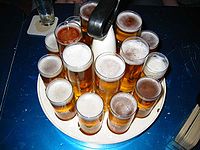- Beer in South Africa
-
Beer in South Africa has a long history, with a corporate history dating back to the early 20th century.
Contents
History
South African beer has had two main influences on its development. Firstly, European settlers who colonized the country brought expertise and know-how as the country was populated. Dutch immigrants from the 1650s onwards, and British, immigrants during the 19th and 20th centuries both contributed in different ways to the knowledge of alcohol production.
Another important but often overlooked influence has been indigenous knowledge. Local breweries, operated by the black population, especially groups such as the Sotho, Zulu and Xhosa, have been brewing forms of sorghum and maize beers long before any Europeans arrived.
Umqombothi, from the Xhosa language, is a traditional beer made in the Transkei, from maize (corn), maize malt, sorghum malt, yeast and water.
Modern day
Today, South African Breweries (SAB) controls the vast majority of the South African beer market, and with the notable exception of imported brands such as Heineken, Guinness and others, SAB owns and produces all the major brands in the country, as well as owning Miller's Genuine Draft (American), Peroni, Pilsner Urquell and long list of others which makes it the world's second largest brewery. Their most popular and valuable brand is Castle Lager, which has a warm and heady taste, although this is often a point of contention.
They also produce Castle milk stout and Black Label, which is traditionally popular among the black population but has in recent years become popular amongst the general population too.
Most beer drunk in South Africa is lager, as the hot climate favours cold drinks. Ales are very rare and are only made by small breweries or imported.
Jo'burg beer, an independent business and low-priced beverage, is dominant among lower-income groups, and incorporates the tastes of traditional brewing.
A number of smaller breweries have sprung up in the past decades. One of these is Shongweni Brewery near Durban producing Robsons bottle-conditioned beers unique to South Africa; another is Birkenhead Breweries in Stanford, near Hermanus in the Western Cape. They produce a number of lagers and ales.
Some of the other micro-breweries include:Gilroys Brewery in Muldersdrift, Krugersdorp;
De Garwe in Vereeniging;
Nottingham Road Brewery in Nottingham Road, KwaZulu-Natal;
Tonder Brewery in Broederstroom, North West Province;
Tweedronk Brewery in Nelspruit, Mpumalanga;
Draymans in Silverton, Pretoria;
Other commonly drunk beers in South Africa is Windhoek Lager, a beer from Namibia made according to the Reinheitsgebot, as well as Tafel Lager, another Namibian import.Homebrewing Culture
There is a fairly large homebrewing community in the major metropolitan cities throughout the country. Homebrewers meet on a monthly basis in some areas under the Worthog Brewers moniker and discuss brewing techniques and the like.
The homebrewing community have strong support from South African Breweries, who frequently assist in arranging days out where homebrewers can dispense their products to the public without obtaining retail licenses. SAB assume ownership of the products and allow the brewers to sell the products as SAB representatives, and keep the proceeds.
Examples of these include the Clarens Beer Festival in Clarens, Freestate and Solstice Festival & Hopsfest in Broederstroom, Northwest Province
See also
- Beer and nationality
References
External links
Beers of the world Africa 
Asia Europe Americas Oceania Beer and breweries by region · List of countries by beer consumption per capita · Alcohol belts of EuropeCategories:- Beer and breweries in South Africa
- South African cuisine
- Economy of South Africa
Wikimedia Foundation. 2010.
